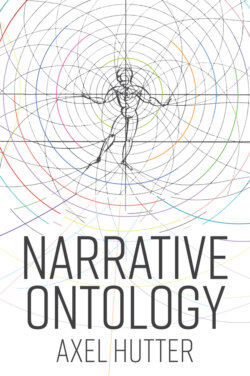Читать книгу Narrative Ontology - Axel Hutter - Страница 28
Identity of Form and Content
ОглавлениеThe last thought prepares the way for understanding an important sentence of the Joseph novel, though its significance for the narrative composition as a whole does not, to be sure, immediately catch one’s eye. It reads as follows: ‘A stupid, uneducated man of a meaningless soul might doltishly utter such a word free of any relation, thinking only of the immediate and actual reference’ (71). Like every sentence, this sentence has in the first instance a literal or immediate, isolated meaning. The context in which it is embedded by the earlier line of thought lends it, however, a less ‘doltish’ meaning, for it no longer appears ‘free of any relation’, that is, as a single sentence, but rather becomes intelligible as an important link in an overarching unity of meaning.
The phrase that bemoans the absence of a narrative sounding board in the ‘stupid, uneducated man’ has been made to resound through the previous remarks, for it now makes sense why, for the Joseph novel, the ‘stupid, uneducated man’ is in a very precise and sober sense meaningless – that is, without meanings. The stupid man experiences and recognizes no meanings since he does not recognize any ‘relations’ that make up the peculiar fabric (Latin: text) through which the meaning of language and the narrative is constituted. Instead, the ‘meaningless soul’ remains invariably stuck to what is closest and most graspable, without the power to raise itself above immediate being to mediated meaning.
Attention to the narrative dimension of meaning of ‘relations’ is not only demanded, then, of the reader of the novel, but appears pointedly within the novel itself. The narrative form of the novel corresponds in this way precisely to its narrative content: the formal perspective of the narrator, which in the case of the Joseph novel is also and above all the perspective of a reflective reader of the original text, coincides with the narrated content. The novel itself is that of which it narrates.2
To be sure, the identity of form and content would not be complete if the attention to the meaning that makes the narrator into a narrator appeared in the narrative itself only in the mode of negation – that is, as inattentiveness. The ‘stupid, uneducated man of a meaningless soul’ represents for this reason, in the Joseph novel, only the obscure background against which the meaningful figures of Jacob and Joseph can stand out, gaining their meaning precisely by being two narrative figurations of the attentive ‘meaningful soul’.
In this way, in the Joseph novel, an essential character trait of Jacob’s is formed by his specific gift of being attentive to the resonating harmonics of words and stories: ‘For Jacob was not a man to avail himself of such a curse merely as a feeble allusion. His mind had the power to merge the present most dreadfully into the past, to reestablish the full force of that prior event’ (71). Jacob’s ‘dignity and spiritual solemnity’ is thereby concisely outlined and traced back to its ground, its true source. The ‘blessed one’ is no longer trapped within the narrow confines of the immediate present and, for precisely that reason, lives in a story (and not merely in a Now without relations, or in a meaningless series of single now-points). The blessed one experiences a past and a future in that distinguished and ‘meaningful’ sense which sets itself apart from the banal superficiality with which we all somehow know that there was a yesterday and there will be a tomorrow. A central aspect of the ‘blessing’ that Thomas Mann understands as Abraham’s legacy consists, then, in the gift of being acquainted with time in its fullness, in the talent of being able to link the present with the past and future. The one who is blessed with a sense for narrative relations links the present with the past such that the present becomes a citation, a repetition of an original model that foreshadows a final end.
This characterizes how Thomas Mann, as author and as a narrator who re-narrates, reads the original text. The manner of his reading is articulated, in fact, in the Joseph novel itself, for it is nothing other than a very specific way of reading the original text: in its reflective reading, the novel highlights and translates precisely those narrative references to earlier and later that are contained in the original story itself.
Thus, a complex intertwining of narrative levels of meaning emerges: the inner meaning of the original story consists in a narrative ontology in which being is understood – in a sense that is still in need of elucidation – narratively and historically: as (hi)story. For an adequate understanding, this original story is re-narrated by Thomas Mann himself with the explicit intention of raising the original meaning of the story, its narrative ontology, more clearly into consciousness. He does this by consistently highlighting and thoroughly reflecting the narrative relations – that is, the echoes of the single events in the story’s temporal resonance chamber.
